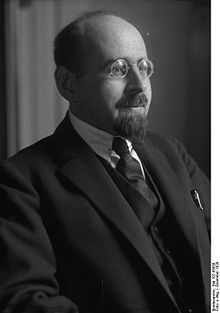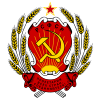- Nikolay Krestinsky
-
Nikolay Krestinsky 
Responsible Secretary of the Russian Communist Party In office
December 1919 – March 1921Preceded by Elena Stasova
(as Chairman of the Secretariat)Succeeded by Vyacheslav Molotov People's Commissar for Finance of the Russian SFSR In office
16 August 1918 – 22 November 1922Premier Vladimir Lenin Preceded by Isidore Gukovsky Succeeded by Grigory Sokolnikov Personal details Born July 13, 1883
Mogilev, Mahilyow Voblast, BelarusDied 15 March 1938 (aged 54)
Moscow, Union of Soviet Socialist RepublicsPolitical party All-Union Communist Party (bolsheviks) Nikolay Nikolayevich Krestinsky (Russian: Николай Николаевич Крестинский; 13 October 1883–15 March 1938) was a Russian Bolshevik revolutionary and Soviet politician.
Contents
Biography
Origins
Krestinsky was born in the town of Mogilev,[1][2] in what is now Mahilyow Voblast of Belarus. According to Russian archivist A. B. Roginsky, Krestinsky was of ethnic Russian origin.[1] Other sources suggest ethnic Ukrainian origins,[2] while according to Felix Chuev, Vyacheslav Molotov maintained that Krestinsky's family had converted from Judaism to Eastern Orthodoxy.[3]
Rise to the top
Krestinsky joined the Russian Social Democratic Labor Party in 1903 and sided with its Bolshevik faction. After the February Revolution, which overthrew monarchy in Russia, he proved to be a capable organizer and was elected to the Central Committee of the Bolshevik party on August 3, 1917 (Old Style). He was made a member of the first Soviet Orgburo on January 16, 1919 and the first Politburo on March 25, 1919. He was also made a member of the Central Committee Secretariat on November 29, 1919 and served as the party's Responsible Secretary for the next 1.5 years.
Fall from power
In late 1920-early 1921, after the Bolshevik victory in the Russian Civil War, Krestinsky supported Leon Trotsky's faction in an increasingly bitter dispute over the direction of the country. After Vladimir Lenin's victory at the X Party Congress in March 1921, Krestinsky lost his Politburo, Orgburo and Secretariat posts and became Soviet ambassador to Germany. The post was an important and sensitive one because of Soviet Russia's crucial and delicate relationship with Germany at the time, but not nearly as important as his previous posts.
Krestinsky supported Trotsky and the Left Opposition in 1923-early 1927, but distanced himself from Trotsky later in 1927. He completely broke with the opposition [4] in April 1928.
The show trial
Krestinsky continued working as a diplomat until 1937 when he was arrested during the Great Purges. He was put on trial (as part of the Trial of the Twenty One) on March 12, 1938. While almost all other defendants admitted their guilt during the Moscow Show Trials, Krestinsky at first denied everything, but reversed himself the following day:
On March 12, he said to the presiding judge, Vasili Ulrikh:
I do not recognize that I am guilty. I am not a Trotskyite. I was never a member of the "right-winger and Trotskyite bloc", which I did not know to exist. Nor have I committed a single one of the crimes imputed to me, personally; and in particular I am not guilty of having maintained relations with the German Secret Service.
The following day, he made a total reversal on his position:
Yesterday, under the influence of a momentary keen feeling of false shame, evoked by the atmosphere of the dock and the painful impression created by the public reading of the indictment, which was aggravated by my poor health, I could not bring myself to tell the truth, I could not bring myself to say that I was guilty. And instead of saying, "Yes, I am guilty," I almost mechanically answered, "No, I am not guilty."
Such a reversion was a rare episode in the show trials of the late 1930s. Krestinsky was sentenced to death and executed in March 1938[citation needed]. He was partially exonerated during Nikita Khrushchev's partial destalinization and was cleared of all charges during perestroika[citation needed].
References
- ^ a b Roginsky, A.B. (Ed.). "1938. March". 1998. The Communarka Memorial. Жертвы политического террора в СССР (Victims of Political Terror in the USSR). Memorial International Historical-Enlightenment, Human Rights and Humanitarian Society. 26 Feb. 2009. (Russian) http://www.memo.ru/memory/communarka/Chapter5.htm
- ^ a b Rumyantzev, Vyacheslav. "Крестинский Николай Николаевич " ("Krestinsky Nikolai Nikolaevich"). ХРОНОС – Всемирная История в Интернете (HRONOS World History on the Internet). 26 Feb. 2009. http://www.hronos.km.ru/biograf/krestinski.html (Russian)
- ^ Chuev, Felix (ed), Molotov Remembers: Inside Kremlin Politics, 1993, Dee Ivan Inc
- ^ Gus Fagan Biographical Introduction to Christian Rakovsky, 1980
Political offices Preceded by
Isidore GukovskyPeople's Commissar for Finance of the RSFSR
16 August 1918 – October 1922Succeeded by
Grigory SokolnikovPeople's Commissars for Finance (1917-1946) Ivan Skvortsov-Stepanov • Vyacheslav Menzhinsky • Isidore Gukovsky • Nikolay Krestinsky • Grigori Sokolnikov • Myrov Vladimirov • Nikolai Milutin • Varvara Yakovleva • Vasili Popov • M.N. Umonov • Arseny Sofronov • Alexei Homespun • Arseny Sofronov
Ministers of Finance (1946-1991) Arseny Sofronov • Ivan Fadeev • Andrei Bobrovnikov • Boris Fyodorov • Igor LazarevSoviet Union · Russian Federation Categories:- 1883 births
- 1938 deaths
- People from Mogilev
- Bolsheviks
- Executed Russian people
- Executed Soviet people
- Great Purge victims
- Russian Constituent Assembly members
- Russian communists
- Ambassadors of the Soviet Union to Germany
- Soviet rehabilitations
- Trial of the Twenty-One
- Politburo of the Central Committee of the Communist Party of the Soviet Union members
Wikimedia Foundation. 2010.
